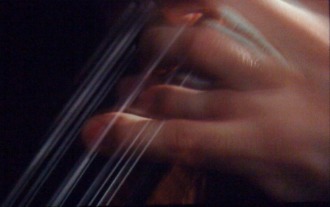Alongside music representing elephants, swan, and kangaroos in Saint-Saëns’ Carnival of the Animals, there’s a section of music titled “Pianists” — additional creatures caged in the zoo. There are still plenty of occasions when classical performers’ hands, feet, and fingers are ogled, when playing is lauded just for dexterity, and coordination, for the technique that may allow art. For today’s virtuoso musician, the term “virtuoso” can be puzzling.
In classical music culture, there’s a lot of showing off, a lot of physical virtuoso spectacle. (Ah, to be instead a virtuoso oracle — or to possess a virtuoso auricle…) Formally dressed in the old style, in my penguin suit (tails!), I used to feel a fairly direct kinship to monkeys in the circus. Virtuosity awes, amuses, causes amazement, incites envy.
I’d like to root the word “virtuosity” in “virtue,” and even “truth.” While fancy passages, brilliantly executed, can stir the blood, some extraordinary examples of virtuoso playing (Heifetz’s 1939 recording of Brahms’s Violin Concerto) almost physically uplift us as we listen — an exaltation of the spirit.
So truth, uplift, virtue. Virtue-osity! Many old treatises of piano playing were titled Gradus ad Panassum! So we can climb. And perhaps we can use our fleet fingers to make real objets de vertu.
A cello-playing colleague warns that we must take care — as we acquire more and more physical mastery — to guard and develop our values, our goodness. Arriving at that mountaintop, that technical pinnacle, our chops will end up revealing just what kind of human beings we are — this verity.
Alternatively, virtuosity has been associated with the devil. For those who have not practiced 10,000 hours, perhaps only a deal with Satan could explain jaw-drop-inducing technical pyrotechnics? At Paganini’s death, the burial of his physical remains in consecrated ground was prohibited for years (though perhaps only because he didn’t receive the Last Rites).
Edward Said has written that too much virtuosity (or too facile a virtuosity) might compromise musical impact or meaning. That’s Aristotle: too much of a good quality becomes a bad one. While we may aspire to play right notes, there are occasions when the difficulty or even struggle to produce the right notes is something we want to hear too.
Making everything in music easy, or making everything seem easy, is a kind of “easy virtue” — and that’s not virtuous at all.


After I heard you play some of Alvin Curran’s intensely quiet music, I realized that virtuoso playing can encompass virtuoso sound perception, virtuoso awareness of time, and even (you made me believe) a virtuosity of response to emotion as conveyed by musical sounds.